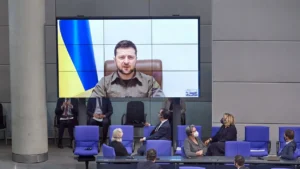With a few minor setbacks, support continues to flow into Ukraine from D-A-CH.
By Günther Jahnl & Audra Grigus

Germany has a long standing tradition to not export military weapons to other countries. This has been a commonly accepted fact of German procedure, until voices criticizing Germany’s abstaining from involvement became loud enough that the country historically changed its course.
Annelena Baerbock, the newly minted Minister or Secretary of Foreign Affairs and a member of the Green Party, and Economy Minister Robert Habeck said, “After Russia’s shameless attack, Ukraine must be able to defend itself. It has an inalienable right to self-defense. The German government is therefore supporting Ukraine in providing urgently needed material. The federal government is therefore supporting Ukraine in providing urgently needed material.”
This is a significant shift that resulted in the German government sending weapons and other supplies directly to Ukraine. Germany has also supported restrictions of the SWIFT global banking system, which disabled the largest Russian banks from inter-bank transfers, practically cutting off the flow of money. Outside of finances, weapons are being moved into strategically accessible positions, as Germany sent 1,000 anti-tank weapons and 500 “Stinger” surface-to-air missiles to Ukraine.
“The Russian invasion of Ukraine marks a turning point. It threatens our entire post-war order,” German Chancellor Olaf Scholz said in a statement. “In this situation, it is our duty to help Ukraine, to the best of our ability, to defend itself against Vladimir Putin’s invading army.”
Ukraine President Volodymyr Zelenskyy virtually stood before the Bundestag on March 17, however, to let them know that Germany’s efforts were not enough. In a scathing critique, Zelenskyy accused Germany of putting its economy before his country’s security, weakly enforcing sanctions,
Zelenskyy pressed the Bundestag to not let a new wall divide Europe, urging support for his country’s membership of NATO and the European Union.
In a statement paralleling U.S. President Ronald Regan’s 1987 appeal to Mikhail Gorbachev, Zelenskyy implored, “Dear Mr Scholz, tear down this wall.”
Die Welt called it a “black day for [Olaf Scholz’s] coalition” and “a disgrace for parliament.”
In a rather unprecedented move, the usually neutral, secretive, and uninvolved Swiss have also changed their stance, freezing Russian assets in Swiss banks. Switzerland has announced 35 tons of humanitarian and medical aid that they will provide to Kiev. They have activated the S-Permit, which allows people to live and work in Switzerland for a year. Ukrainian refugees are otherwise permitted to stay for 90 days without a visa in the country and will be supplied with emergency aid, including clothes, and cash. Mere days after the initial invasion, Swiss transit networks announced anyone fleeing the conflict could travel free on long or short-distance trains, along with many other countries around Europe.
Switzerland has set aside $86 million as an act of solidarity with Ukraine. Three-quarters of these funds will go to the Red Cross, UN agencies, and international and local NGOs and projects implemented by the Swiss Agency for Development and Cooperation (SDC) in Ukraine. The last quarter will go toward helping refugees in neighboring countries of Ukraine.
In the State of the Union address on March 1, U.S. President Joe Biden fondly noted that “even Switzerland” was holding Moscow accountable for the invasion. This statement was polarizing for right-leaning, neutrality seekers and left-leaning, hopefuls who want to aid Ukraine.
Poland declared that they would loan the country their entire fleet of Mig-29s, a type of aircraft that is mostly labeled with Russian instruments that are understood by Ukrainians pilots. The transaction would have led them through Rammstein Air Force base, which the U.S. government quickly denied them access to. This comes on the heels of Putin saying that any direct support could be seen as an act of war itself.
According to Reuters, Putin has accepted 16,000 foreign volunteer soldiers from middle-eastern countries to aid Russian forces on their invasion. Ukraine has done the same, however the number of available military personnel between both nations and the firepower differs greatly between the invading Russian forces and Ukrainians who are steadfast in defending their home.
Many countries, such as Austria, prohibit its citizens from taking up arms in a foreign conflict. If any Austrian were to enlist with Ukrainian, or unfathomably Russian, forces, the Austrian government would rescind this person’s citizenship.
As a member of the EU, but not a member of NATO, Austria’s neutrality is challenged by the EU’s commitment of $500 million in weapons and aid packages to Ukraine. Austrian Chancellor Nehammer tweeted, “Austria was neutral, Austria is neutral, Austria will remain neutral,” bringing up the ethical question of whether being a member state in an organization that now supplies military equipment and other aid impacts the foundations of neutrality?
A version of this post was released in the Hier & There podcast in the S4E13 “Language Learning and Grammar Journey” episode.